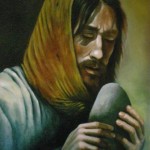 Temptations: The Journey through the Wilderness
Temptations: The Journey through the Wilderness
We say that the Season of Lent lasts forty days, as the Latin word, ‘Quadragesima” suggests. When I was a young seminarian – sceptical as I was – I took the calendar and wanted to make sure for myself if there were indeed 40 days from Ash Wednesday to Easter Sunday. To my surprise, I found there are actually 47 days. I had reasons to be sceptical, after all! So I had a question for the teacher of liturgy, who, of course, was taken by surprise. Later he came up with a meaningful explanation: even on Sundays in Lent, we celebrate the Resurrection of the Lord, and hence they are not counted as days of fasting and penance. So Lent does have forty weekdays of fasting and penance!
‘Forty’ is symbolic of a generation, a lifetime. The people of Israel walked in the wilderness for forty years (Dt 8:2). Practically, it was a new generation that entered ‘the Promised Land’ (Num 32:13). The number forty symbolises a time of prayer: Moses spent 40 days in communion with God on Mount Sinai (Ex 24:17-18; 34-28). Forty symbolises every person’s journey to the mount of God as Elijah “walked for forty days and forty nights until he reached Horeb, God’s mountain” (1Kings 19:8). It is this journey that the Season of Lent reminds us of!
Every year on the first Sunday of Lent the Liturgy of the Word invites us to meditate on the temptations of Jesus. The synoptic gospels (Mk, Mt, Lk) capture at the beginning of the public of ministry of Jesus what John narrates as a lifetime of discernment of the will of the Father (read Jn 6:15, 30-31; 7:3). The narrative of the temptations of Jesus in the synoptic gospels resembles those of the people of Israel in the wilderness, and it is also our own struggle today.
The first temptation: The first test for the people of Israel in the wilderness was hunger (Dt 8:3). This was soon after their miraculous crossing of the Red Sea (Ex 16). When they experienced hunger their temptation was to go back to Egypt (Ex 16:3). They see the freedom of being in the presence of God as a trap! The Lord God reminds them that he is capable of giving them bread from heaven, but man does not live on bread alone.
Faced with hunger, Jesus does not give into grumbling, nor use his powers to satisfy himself. He is more than just the body. By resisting the hunger of the body, Jesus is open to the Word of God – the Will of God. Today, we live in a world of KFCs and McDonalds. Our high streets are full of body-shops! It revolves around the body. The season of Lent reminds us that we are not just the body. We do not live on bread alone. It is God who can satisfy our inner thirsts.
The second temptation: Having been fed with the manna, the people of Israel demanded that God prove that he cared for them by meeting all their needs. And when the problems were not immediately solved, they question: “Is the Lord among us or not?”(Ex 17:7). And Moses reminds them, “Do not put the Lord your God to the test, as you tested him at Massah” (Dt 6:16).
Often we hear preachers say, “Faith is taking a blind leap!” Is that so? Is Jesus’ unwilling to take that leap from the pinnacle of the temple the lack of trust in his Father or is it the ultimate expression of faith? God does not have to show he cares for me through magic. I do not have to condition God even with my faith. I do not have to put the Lord to the test. I let God be God!
The third temptation: The Lord God desired to lead the people of Israel to the Promised Land – which was a symbol of the covenant between the Him and the people. The people focussed on a physical land, which was not yet in view (even to this day)! Even as Moses was on Mt Sinai, the people of Israel turned aside from the way the Lord had led them through. They worshipped a golden calf (Ex 32:8). The Lord God reminds them, I am the Lord your God (Dt 26:10) – as we heard read in the first reading of today.
When faced with a similar situation, Jesus chooses to trust in his Father! Despite the promise of power over “all the kingdoms of the world”, Jesus prefers the heart of the human person. He invites us to worship that which our heart is ultimately directed to: God alone!
For a similar homily: CLICK HERE